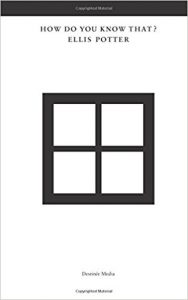How Do You Know That? (Ellis Potter, 2016)

On believing, knowing and finding
“Epistemology,” Ellis Potter insists, “is not a disease” (p. 9). It is also not something boring we can ignore. It is not, in other words, like geometry. Speaking of geometry I was in a book discussion recently and someone mentioned Pythagoras’s theorem and I realized with a jolt that this was, as far as I could remember, the first and only time a2 + b2 = c2 had entered my head since high school and that I still had no idea why it’s so significant or how it’s useful (except on exams).
I digress: my point is that epistemology is practical, helpful and really quite important, even though the word epistemology, which isn’t the point, may seem intimidating. We may not realize it, but it comes up in every conversation about things that matter, and when we say “I know” or “I don’t know” or “I believe” or “I don’t believe” or “I’ll find out” or “What do you think?” or “I think that…” So, thinking about it at least a bit might be wise. Especially since we don’t know perfectly or completely, and because when people hear what we say we believe or know they often ask, “How do you know that?” Which is a very good question.
And in How Do You Know That?, a succinct and thoughtful explanation for ordinary Christians, my friend Ellis Potter helps us understand how we know what we know, and how knowing that helps us have greater clarity, certainty and humility. It also helps us explain why we believe what we do, and how to help friends examine rival truth claims.
Ellis says that we know things through four sources. Imagine a square, he says, and the four sources of knowledge are the four corners:
Bible (Revelation)
Rationality
Institution (Tradition)
Experience
Each of the four corners is a different authority for our knowledge of reality. Each corner is unique, in the sense that it tells us something that the other corners cannot. Each corner is essential, in the sense that we cannot understand God and the whole of reality if we leave any of the corners out of the epistemology.
We need all four corners. We cannot know reality truly if we only have our rationality. We cannot know reality truly if we only have the authority and tradition of the community. We cannot know reality truly if we sit in a room and read a holy book all day. If we have only personal experience, and we see angels and make prophecies, but don’t have the other corners to complete our understanding of reality, then our personal experience is not enough—and may even be dangerous.
Sometimes people want to know, “Which of the corners is most important? Which one takes precedence over the others?” But the four corners are not a hierarchy. No one is higher than another. They are a complementarity, meaning that all are necessary for understanding reality. There is no one corner that dominates all the others. They are not equal in function, nor are they interchangeable. They are all essential and distinct and unique. None of them are dependent, and none of them is first. They’re all primary and all original. [p. 35-36]
How Do You Know That? is based on a lecture Ellis has given numerous times all over the globe to all sorts of groups. It ends with 33 questions that people have raised and that are great starting points for discussion. He also defines the two axes of the square —horizontal and vertical— and I’ll leave that for you to explore as you read.
Ellis Potter is gifted in knowing how to speak in helpful ways to the ordinary things of life most of us have barely noticed. How Do You Know That? is one such gift, and I recommend you read it, and discuss it with friends.

